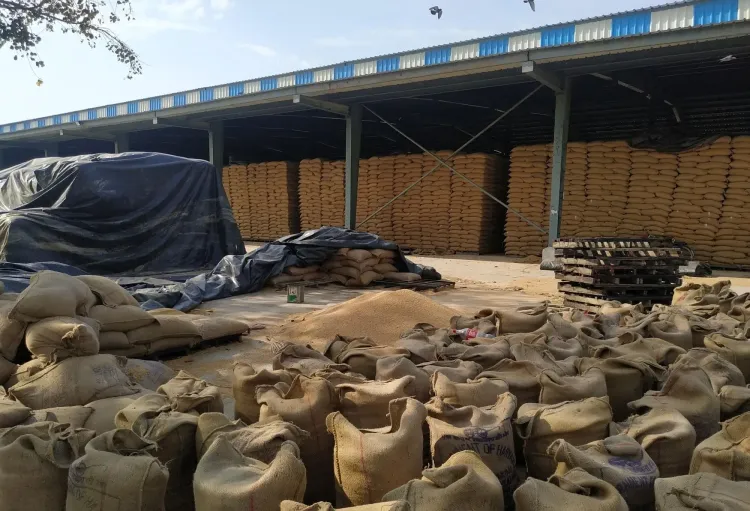Is India Expanding Foodgrain Storage Capacity to Match Rising Farm Production?

Synopsis
Key Takeaways
- India's foodgrain production reached 353.96 million tonnes in 2024-25.
- The Food Corporation of India and state agencies manage significant storage capacities.
- Decentralized storage through PACS is expanding.
- Government initiatives aim to strengthen agricultural infrastructure.
- Cold storage and warehouses are crucial for reducing waste.
New Delhi, Sep 28 (NationPress) As India's foodgrain production reached an unprecedented 353.96 million tonnes in 2024-25, the nation has also made strides in enhancing its storage capacity to mitigate post-harvest losses and connect farmers to markets, thereby enabling them to achieve improved profits.
The Food Corporation of India (FCI) and state agencies currently manage a total of 917.83 lakh metric tonnes of covered and CAP storage for central pool grains, along with 8,815 cold storage facilities nationwide, which can hold 40.21 million metric tonnes of perishables, according to an official announcement made on Sunday.
Moreover, the expansion of decentralized storage is evident, with 5,937 new primary Agricultural Credit Societies (PACS) registered and 73,492 computerized as of June.
To enhance the efficiency of PACS, the government has launched a project to computerize operational PACS, with a financial commitment of Rs 2,516 crore, improving transparency, record-keeping, and operational efficiency, the statement noted.
Robust storage infrastructure is crucial for effectively managing India’s food supply chain, minimizing waste, and safeguarding the interests of both farmers and consumers. Adequate storage solutions, including cold storage and modern warehouses, play a significant role in decreasing agricultural produce wastage.
This infrastructure is essential for maintaining a buffer stock of foodgrain, crucial for national food security and for distribution through programs like the National Food Security Act (NFSA). The buffer stock acts as a safeguard against severe price fluctuations in essential goods, allowing the government to intervene in the market to stabilize prices by releasing foodgrain when necessary.
Initiatives like the Agriculture Infrastructure Fund (AIF), Agricultural Marketing Infrastructure (AMI), Pradhan Mantri Kisan SAMPADA Yojana (PMKSY), and the World’s Largest Grain Storage Plan are fortifying storage, processing, and securing farmers' incomes.
Launched in 2020, the AIF aims to bolster agricultural infrastructure throughout India. It offers a medium-to-long-term debt financing facility with interest subvention and credit guarantee support for investments in viable post-harvest management projects and farming assets.
This scheme emphasizes the establishment of farm-gate storage and logistics facilities that empower farmers to store their produce efficiently and sell it at favorable prices, reducing post-harvest losses and reliance on intermediaries.
Infrastructure such as warehouses, cold storage, grading units, and ripening chambers enhances farmers’ access to broader markets and improves income realization.
As of September, Rs 73,155 crore has been sanctioned for 1.27 lakh projects under the AIF, covering thousands of warehouses and cold storage units, with a total project cost of Rs 1.17 lakh crore.
The government’s AMI scheme is a fundamental part of the Integrated Scheme for Agricultural Marketing (ISAM). This initiative aims to strengthen agricultural marketing infrastructure in rural India by offering financial support for constructing and renovating godowns and warehouses.
By June 30, 2025, 49,796 storage infrastructure projects have been approved across 27 Indian states, contributing to a total storage capacity of 982.94 lakh MT, supported by a total subsidy of Rs 4,829.37 crore.
The Pradhan Mantri Kisan SAMPADA Yojana (PMKSY) is a holistic scheme aimed at developing modern infrastructure within the food processing sector, ensuring a seamless and efficient supply chain from farm gate to retail.
Since its inception, 1,601 projects have received approval under various components of PMKSY as of June 2025, with 1,133 projects now operational or completed, generating a processing and preservation capacity of 255.66 lakh metric tonnes per year.
Additionally, in May 2023, the government sanctioned the World's Largest Grain Storage Plan in the Cooperative Sector, in line with the vision of ‘Atmanirbhar Bharat’.
This scheme focuses on developing agricultural infrastructure at the PACS level, including godowns, custom hiring centers, processing units, and fair price shops through a convergence of existing government programs.









